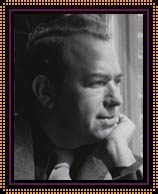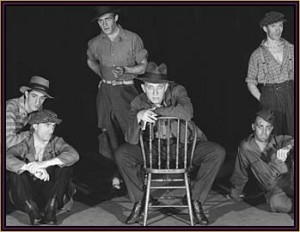 A lyricist and author best known for his Academy Award-winning song “Over the Rainbow,” Yip Harburg began songwriting after his electric appliance business failed at the start of the Great Depression. His first hit song was “Brother, Can You Spare a Dime,” written with composer Jay Gorney in 1932. Harburg continued to write lyrics for Hollywood musicals, producing such popular songs as “It’s Only a Paper Moon,” “April in Paris,” and “Suddenly.” He was teamed with composer Harold Arlen for the 1939 MGM classic THE WIZARD OF OZ and wrote lyrics for its well-known songs, including “We’re Off to See the Wizard,” “Ding, Dong, the Witch is Dead,” “If I Only Had a Brain,” and “Over the Rainbow.” Blacklisted in Hollywood following World War II because of his political views, Harburg turned to Broadway in 1947. Here he co-wrote the libretto and was lyricist for “Finian’s Rainbow” and also worked on the Broadway show “Flahooley.” Over the years Harburg worked with such musical legends as Ira Gershwin, Jerome Kern, John Green, Vernon Duke, Burton Lane, and Arthur Schwartz.
A lyricist and author best known for his Academy Award-winning song “Over the Rainbow,” Yip Harburg began songwriting after his electric appliance business failed at the start of the Great Depression. His first hit song was “Brother, Can You Spare a Dime,” written with composer Jay Gorney in 1932. Harburg continued to write lyrics for Hollywood musicals, producing such popular songs as “It’s Only a Paper Moon,” “April in Paris,” and “Suddenly.” He was teamed with composer Harold Arlen for the 1939 MGM classic THE WIZARD OF OZ and wrote lyrics for its well-known songs, including “We’re Off to See the Wizard,” “Ding, Dong, the Witch is Dead,” “If I Only Had a Brain,” and “Over the Rainbow.” Blacklisted in Hollywood following World War II because of his political views, Harburg turned to Broadway in 1947. Here he co-wrote the libretto and was lyricist for “Finian’s Rainbow” and also worked on the Broadway show “Flahooley.” Over the years Harburg worked with such musical legends as Ira Gershwin, Jerome Kern, John Green, Vernon Duke, Burton Lane, and Arthur Schwartz.
E.Y. “Yip” Harburg
- "Americana"
- "Bloomer Girl"
- "Finian's Rainbow"
- "Flahooley"
- "Hooray for What!"
- "Jamaica"
- "Life Begins at 8:40"
- Harold Arlen
- Eddie Cantor
- Barbara Cook
- Ira Gershwin
- Bert Lahr
- David Merrick
- Ethel Merman
- Shubert Brothers
- Florenz Ziegfeld
Harburg noted that he was influenced by his teachers at City College and by authors George Bernard Shaw, Sir William Schwenk Gilbert, Jonathan Swift, Sean O’Casey, Oscar Wilde, and Mark Twain, all of whom were noted satirists. When asked about his techniques for composing lyrics, Harburg told CA [CONTEMPORARY AUTHORS]: “Anything goes, as long as it generates a song. Most ballad tunes are written first, and the lyrics fitted to the music. Sometimes the composer is given a title or possibly a line or two to work with. Most comedy songs start with several lines or possibly a whole verse. There are no formulas. Everything is geared to the particular psyches of composer and lyricist.”
Harburg believed that musicals “have become a lost art for the newer generation that is undisciplined, without roots in poetry or literature.” He called “The Wiz,” a modern version of THE WIZARD OF OZ, “a theatrical disgrace in keeping with the ugliness of today’s culture.”
In Harburg’s view, popular songs today “are not joyous. They’re grim.” He told Aljean Harmetz that songs are not written with “the craftsmanship, and the fine skill of the composers of the ’20s and ’30s. … Today even when there is no melody, the sound engineer can give you enough vibrations to make a song a hit.”

Harburg's song "Brother, Can You Spare a Dime" was featured in the musical "Americana."
Of his own songs, Harburg reflected, “It is hard to say which is my favorite, but I would rate ‘Last Night When We Were Young’ as a possible choice.” Though the movie THE WIZARD OF OZ has appeared on television each spring for many years, Harburg said he did not watch it every year, “but I [did] like to catch it every so often.”
Harburg, who appeared on the CBS television show 60 MINUTES on March 5, 1978, was co-author of the librettos for “Jamaica” and “The Happiest Girl in the World.” He also wrote two books of poetry entitled RHYMES FOR THE IRREVERENT and AT THIS POINT IN RHYME: E. Y. HARBURG’S POEMS.
Source: Excerpted from CONTEMPORARY AUTHORS ONLINE, Gale Group, © 2001 Gale Group. Reprinted by permission of The Gale Group.
Photo credits: Photofest and the New York Public Library

